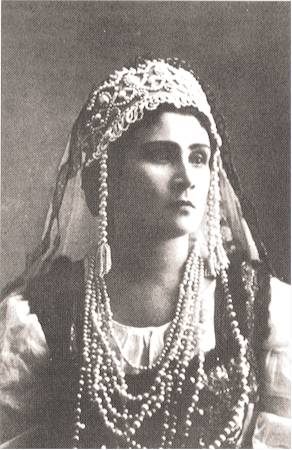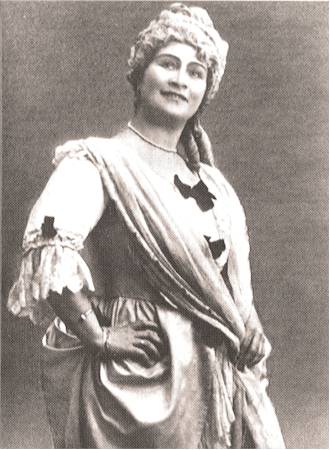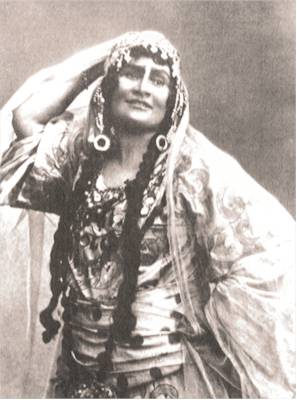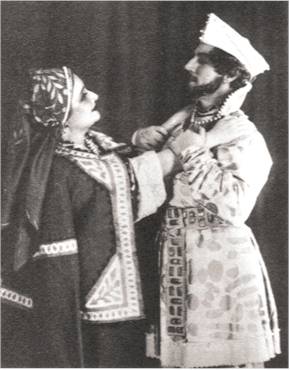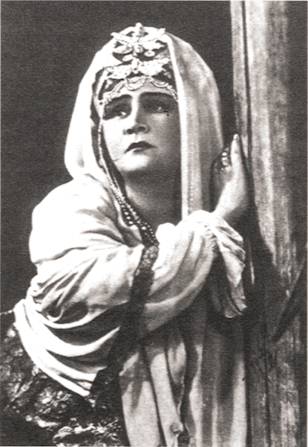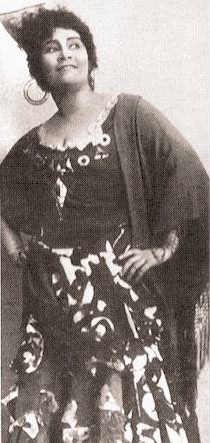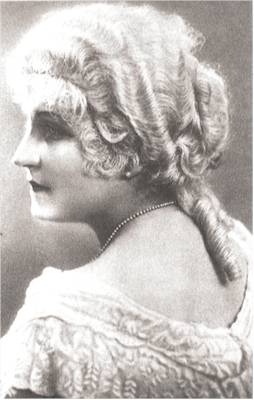Russian mezzo-soprano, 1886 - 1961
As Lyubasha in “The Tsar’s Bride” Biographical notes:
Nadezhda Andreyevna Obukhova was born into a talented Russian family. Her great-grandfather was the poet Yevgeny Boratinsky, a close friend of Pushkin. Her grandfather was the pianist
Adrian Mazaraki, a friend of Nikolay and Anton Rubinstein. Two uncles were singers, one of them became opera director of the Bolshoi. Obukhova’s family spent the summers in Nice where
the girl received first singing lessons by Eleanora Lipman, a student of Pauline Viardot-Garcia
. In 1907 she entered the Moscow conservatory, studying under Umberto Masetti, teacher also of Antonina Nezhdanova,
Nina Koshetz, Beniamino Gigli, Tito Schipa, Riccardo Stracciari and
Valeria Barsova. Following graduation from the conservatory, she appeared in concerts in St Petersburg, Moscow and provincial towns. Nadezhda made her rather late operatic debut at the
Bolshoi in 1916, as Pauline in The Queen of Spades. She soon became one of the most acclaimed opera stars there, appearing as Carmen, Dalila, Marfa, Lyubasha, Spring Fairy in Snowmaiden,
Fricka, Marina, Clarissa in Prokofiev’s The Love for three Oranges and Lyubava in Sadko, among many other roles. In 1922 she took part in the first radio concert in the USSR, singing Pauline’s
aria. In the first radio broadcast from the Bolshoi she appeared in Rimsky-Korsakov’s The Tsar’s Bride, opposite Nadezhdanova, Leonid Speransky and Vasily Petrov. Her concerts which also
included popular repertoire of sentimental songs turned out to be true events wherever she appeared. From the beginning of the 1930s, concert work began to occupy most of her time. In
1937 she was awarded the title “People’s Artist of the USSR.” It was not until that same year, that she was invited to record in the studio (!), but fortunately her voice was still in its prime.
Her repertory was immense, and included opera roles as well as many hundreds of songs and folk songs. Nadezhda Obukhova retired in 1943, spending her time with occasional singing in
concerts, radio broadcasts and recording. Until 1958 (!) she worked exclusively with her sensitive accompanist, Matvey Sakharov, who was also responsible for the arrangements of many
of her songs. Her last concert took place in June 1961, two months before her death in the same year.
Debut as Pauline in “The Queen of Spades” (1916) Nadezhda Obukhova in her own words (1952) “There are no words to express my joy and emotion at being back in my homeland and following classes at the Conservatory. I devoured the knowledge with a passion. My teacher was, as before, Umberto Mazetti. I studied the piano with Professor Goedicke. Acting and dance with Professor Beck. Izbansky conducted us in the opera class. What I loved most of all were the singing lessons. Mazetti was strict and very demanding. Then finally it was the end of my studies. I was sad to leave these buildings, these classes, where I had been so happy. But I was so glad to know that I was now setting out on the conquest of life, with great determination to work and serve my beloved art.” (Note the rather guarded style typical of the Stalinist period)
As Konchakovna in “Prince Igor”
N.O. (Lyubava) and Nikander Khanaev (Sadko)
Comment:
Nadezhda Obukhova was one of Russia’s most beloved artists during the post-war years. Already aged 28 at the outbrake of Worldwar I, she could well be expected to have recorded during the
pre-electric period. Why she was not given the opportunity to do so, will probably never be known. Listening to her records of 1937 onwards you can hardly believe that this is the voice of a 51 years old singer! Hers was a light, lyrical and colorful mezzo-soprano, easily reaching into the low register but with a curiously light, almost soprano timbre in the middle register. She was one of the singers
who always sang within their means. You will never hear her darkening the voice or making it heavier for effect which is certainly one of the reasons for her longevity. If you compare her
earlier recordings of 1937 with her final effort of 1960 (which was the song “Kalinushka Malinushka”), breath and legato is not only intact but better than most singers half her age!
I am full of admiration for her completely unmannered singing. She was able to interpret with freshness, charm and warmth! Obukhova’s recordings are demonstrations of the benefits of good, solid vocal training and
preserving one’s instrument.
Lyubasha was one of her favorite roles
As Carmen Pauline’s aria (Pauline in The Queen of Spades / Tchaikovsky / USSR 1937)
“Lisa was performed by Xenia Georgievna Dzerzhinskaya, a good friend of mine. She was an
exquisite singer, with a fantastic voice, a discrete artist. She had a privileged position at the Bolshoi and received all the main roles for dramatic sopranos. My work at the theatre was always
associated with her, because we were often in the same casts.”
Xenia Dzerzhinskaya as Lisa
|
|||||||||||||||||||||||||||
